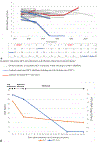Immune Checkpoint Inhibitors Suppress Hepatitis C Virus Replication in Infected Patients With Solid Tumors
- PMID: 37307533
- PMCID: PMC11809494
- DOI: 10.14309/ajg.0000000000002361
Immune Checkpoint Inhibitors Suppress Hepatitis C Virus Replication in Infected Patients With Solid Tumors
Abstract
Introduction: Data are scarce regarding the virologic impact and safety of immune checkpoint inhibitors (ICI) in patients with chronic hepatitis C virus (HCV) infection. We examined the virologic impact of ICI in HCV-infected patients with solid tumors and their safety.
Methods: HCV-infected patients with solid tumor treated with ICI at our institution between April 26, 2016, and January 5, 2022, were enrolled in a prospective observational study. The primary outcomes were ICI-induced changes in HCV viremia (HCV inhibition and HCV reactivation) and safety of ICI.
Results: We enrolled 52 consecutive patients with solid tumors treated with ICI. Most were men (41; 79%), White (31; 59%), without cirrhosis (34; 65%), and with HCV genotype 1 (40; 77%). Four patients (7.7%) experienced HCV inhibition while receiving ICI including 1 patient who developed undetectable viremia for 6 months in the absence of direct-acting antivirals (DAA). Two patients (4%) developed HCV reactivation, both while receiving immunosuppressive therapy for ICI-related toxic effects. Adverse events occurred in 36 patients (69%), and 39 of the 47 adverse events (83%) were grade 1-2. Grade 3-4 adverse events occurred in 8 patients (15%), and in all cases, they were related to ICI, not to HCV. No HCV-associated liver failure or death occurred.
Discussion: Inhibition of HCV replication with virologic cure can develop in patients receiving ICI without DAA. HCV reactivation occurs primarily in patients receiving immunosuppressants for ICI-related toxic effects. ICI are safe in HCV-infected patients with solid tumors. Chronic HCV infection should not be considered a contraindication for ICI therapy.
Copyright © 2023 by The American College of Gastroenterology.
Conflict of interest statement
Dr. Torres is or has been the principal investigator for research grants from the National Cancer Institute, Gilead Sciences and Merck & Co., Inc., with all funds paid to MD Anderson Cancer Center. Dr. Torres is or has been a paid scientific advisor for Dynavax Technologies, AbbVie, Inc., Gilead Sciences, Janssen Pharmaceuticals, Inc., and Merck & Co., Inc.; MD Anderson Cancer Center is managing the terms of these arrangements in accordance with its conflict-of-interest policies. The other authors report no conflicts of interest.
Figures


Comment in
-
Immune-Checkpoint Inhibitors in the Hepatitis C-Infected Patient: To Use or Not to Use?Am J Gastroenterol. 2023 Sep 1;118(9):1554-1555. doi: 10.14309/ajg.0000000000002352. Epub 2023 May 25. Am J Gastroenterol. 2023. PMID: 37417784 No abstract available.
References
-
- Kwon ED, Drake CG, Scher HI, Fizazi K, Bossi A, van den Eertwegh AJ, et al. Ipilimumab versus placebo after radiotherapy in patients with metastatic castration-resistant prostate cancer that had progressed after docetaxel chemotherapy (CA184–043): a multicentre, randomised, double-blind, phase 3 trial. The Lancet Oncology. 2014;15(7):700–12. - PMC - PubMed
-
- Boutros C, Tarhini A, Routier E, Lambotte O, Ladurie FL, Carbonnel F, et al. Safety profiles of anti-CTLA-4 and anti-PD-1 antibodies alone and in combination. Nature reviews Clinical oncology. 2016;13(8):473–86. - PubMed
Publication types
MeSH terms
Substances
Grants and funding
LinkOut - more resources
Full Text Sources
Medical
Miscellaneous

